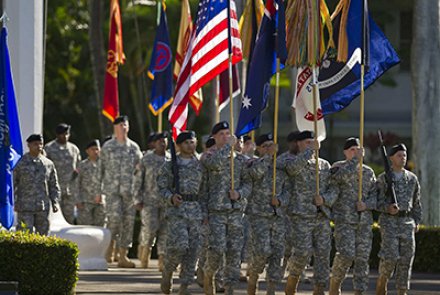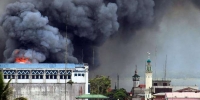
Image by the U.S. Army on Flickr https://www.flickr.com/photos/soldiersmediacenter/8391360197/
The Trump Presidency and Australia's security
A new policy paper recommends Australia finds new ways and intensifies efforts to influence US political decisions on international security issues, while also building closer ties with regional partners in Asia.
The paper, from Crawford School’s National Security College (NSC), explores what the Trump Presidency means for Australia and the Asian region from a security perspective.
NSC Head Professor Rory Medcalf said that as Trump’s Presidency brings change to America’s foreign affairs policy, Australia must adapt.
“It is already becoming obvious that a Trump Presidency will increase global uncertainty and the potential for instability. Trump has no track record in international or security policy,” Professor Medcalf said.
“The alliance with the United States remains central to our national security. We have no realistic alternative. Our interests are extensive and our capabilities cannot protect them in full.
“The alliance is broad and deep enough to survive a Trump Presidency, so we need not panic. But nor can we relax. We will need to reframe our engagement with the United States in plain terms of national interests – theirs and ours.”
The paper,_ The Trump Presidency and Australia’s security: don’t panic, don’t relax_, is published as Donald Trump is sworn in as US President.
It is available to read here - http://nsc.anu.edu.au/research-and-publications/policy-paper-1.php.
In terms of building closer ties with regional partners, the paper lists joint exercises and training, building maritime surveillance with countries like Indonesia and Vietnam, intelligence sharing, as well as transfer of defence technology and open coordination of positions in regional forums such as the East Asia Summit with Japan, India, South Korea and Singapore.
The paper lists four clear key points on how Australia’s security will be affected by the change to a Trump Presidency and makes three policy recommendations:
- Future US international policy has become uncertain, with the unpredictability of President Trump and deep divisions in political and public opinion.
- Security competitors will severely test US resolve and power, while allies will seek to hedge against US unpredictability as well as against Chinese or Russian power.
- Australia’s strategic policy response will need to be steady and interests-based, avoiding both complacency and panic.
- Australia will remain well-regarded in Washington but will need to work hard to convert goodwill to influence with US decision makers and power brokers.
Policy Recommendations:
- Australia should intensify efforts – beyond usual diplomatic and defence channels – to influence US political decisions on international security issues that matter to us.
- Australia should deepen and diversify its security and economic partnerships in the Indo-Pacific, building a strategic web to bind and complement US alliances.
- Government and business needs to directly explain and champion the importance to Australia of our comprehensive ties to the United States, including in new priority domains like cyber security, as well as investment and defence.
Updated: 1 July 2024/Responsible Officer: Crawford Engagement/Page Contact: CAP Web Team













